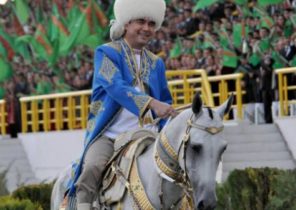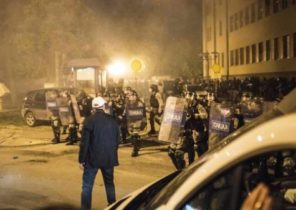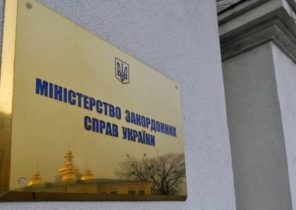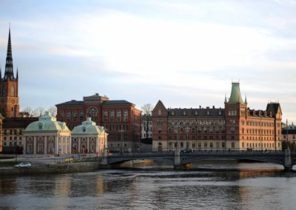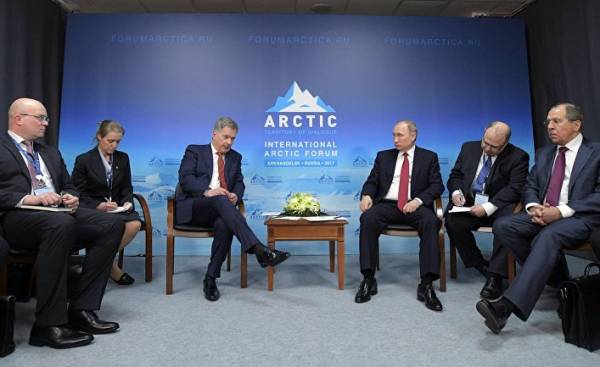
Russia — Russia is experiencing economic difficulties. Moscow is still unwilling to reform, and not. Modern Russia is a dissatisfied power, which has problems with the neighbors. But the experienced diplomat Rene Nyberg (René Nyberg), who served as Ambassador of Finland in Moscow and Berlin, says from his personal experience that to reach agreement with Russia is still possible — even on the issue of missile defence.
Under the rule of Putin, Russia has changed significantly, today it is a country with a medium level of income. But as expressed by Prime Minister Dmitry Medvedev in response to complaints Crimean pensioners in 2016: “no Money, but you hold fast.” This tactless remark became winged, and with him is matched only aphorism of Viktor Chernomyrdin from the 1990-ies. It is still my favorite sharpness Chernomyrdin: “Wanted as better, and it turned out as always”.
The fact that Russia feels economic difficulties, reflected in a recent conversation between the Director and students of the Russian school in Bryansk, a city 400 South-West of Moscow. The discussion began with the advent of the 50-minute video of Alexei Navalny on YouTube dedicated to the property of Dmitry Medvedev.
The scandal intensified, perhaps what used Bulk condescending diminutive “Dimon” to the former President widely dispersed social networks:
Director: (…) I will tell you honestly: right now our economic situation is very unstable. This is an economic pit. And why is all this happening? (…)
Student: Crisis.
Director: what is causing this crisis?
Student: Sanctions, the European Union, this whole blockade.
Director: again — why? The European Union, right? And our leader is very stable and very strong policy. It has an incredibly high rating on the world stage. Why? Thanks to foreign policy. [Russian] domestic policy, of course, quite weak. Why? Well, because there is no money. And we are now witnessing, most…
Student: what exactly is our foreign policy? America is against us. Europe against us. (…)
Such is school in the Russian province.
The Russian economic dilemma can be formulated in the remark that Russia — for many reasons — does not want to reform and not able to do it. The main reason is the lack of the rule of law.
Director of Sberbank and former economy Minister German Gref recently said at a conference in Moscow that Russian economic crisis is not cyclical, but structural. It can be solved using the standard package. He jokingly added that there are two ways to achieve growth in Russia: to manipulate the data of Rosstat (Federal service of state statistics of Russia) and structural reforms. He also mentioned uncertainty in connection with the presidential election in March 2018.
Modern Russia is a dissatisfied power. She has problems with most neighbours. I usually do a pause, and then added with an expression — except Finland. But the undermining of confidence caused by border incidents in 2015, both in Norway and in Finland, showed us that anything can happen. You can quote the Finnish report on the consequences of a possible membership of Finland in NATO from April 2016: “Russia has a tendency to create a problem, use it and then offer to cope with it, while not necessarily solving it.”
However, I would have insisted that the situation, at least now calmed down. Tensions in the Baltic States was and still is a reflection of going to the Ukraine war. But incidents in the air and on the Baltic sea has almost disappeared and this is definitely good news. The deployment of NATO troops in Poland and the Baltic States also took effect. Of course, for the Russian military exercise “Zapad” next fall will be watched with great attention. There would also be several exercises in the Nordic region, among them Swedish “Aurora”, the most extensive military exercises in the country since the end of the cold war.
In my opinion, the repetition of incidents on the Finnish and Norwegian borders is unlikely, although nothing can be ruled out. But all of a sudden re-start to transport people without proper visas through the Finnish or Norwegian border would be a hostile action, which is difficult to find an explanation.
The starting point for Russia in this part of the world remains the security of St. Petersburg and its ability to inflict a retaliatory nuclear strike based on the forces on the Murmansk coast. Heart of the country and its vital resources anywhere so not come close to the external borders, as in the North-East of Russia.
Not the southern part of the Baltic sea, the Karelian isthmus or the road to Smolensk worried the General staff of Russia. They are afraid of technological surprises that could push them face to face with a new threat that undermines their ability to inflict a retaliatory nuclear strike. It would hurt the basis of superpower status, which is so important to Russia. Russia, of course, painfully aware of its military, economic and technological deficiency in comparison with the United States. But I would like to draw attention to missile defense. It is too early to make predictions regarding whether the United States and Russia in the coming years to go back to the negotiating table and talk again about nuclear weapons and missile defense.
The only thing I can tell you from personal experience, is that the negotiations on missile defense, which contributed to the foreign Ministry of Finland that I took in 2010 on an island in the Gulf of Finland, between Russian and American experts on arms control and retired generals, has shown that agreement is still possible and on the issue of missile defence.
Russian perspective on Scandinavia and Scandinavian countries are very traditional, even conservative and deeply rooted in history. That’s why Finland to Russia — part of the “Swedish in the world” and not the “Russian world”.
While that is the best tweet I have ever missed — because at that time was a member of the Finnish industry and could not freely tweeting — are the words of Carl Bildt from the Swedish Embassy in Moscow in 2012: “the most Important achievement of Sweden was the Foundation of the Russian state”.
In his highly acclaimed book “Stalin in the fate of Finland,” published last fall, Professor of Rentol Kimmo (Kimmo Rentola) from the University of Helsinki says that, for Stalin, Finland was the border States. The word is no longer used, but it means something like “borderland”. But Rentol continues: “Molotov declared in 1940 that the Winter war actually was a war Sweden”. Now Finland — other countries. Saint Petersburg, of course, receives many benefits from proximity to Finland, which is now a bit more than those famous pre-war 30 kilometers.
Unlike Norway and Finland, in Sweden, there are no significant bilateral interests with Russia. To paraphrase the old Clinton slogan: “It’s the geography, stupid!” And it explains a lot, including the path of development in which Swedish-Russian relations seems to have lost its bilateral component. In this respect, very important was the visit of Minister for foreign Affairs Margot wallström (Margot Wahlström).
Even after the annexation of Crimea and EU sanctions, that is, us, Finland and Sweden, among the 28 members of the Union, and Finland, and Norway continued to make efforts to ensure that the dialogue with Russia continued.
The visit of President Niinistö in Sochi in August 2014 was to assure that Finland continues the dialogue with the Kremlin. This trip has implied certain risks. As head of state, a member of the EU, Niinistö went to Sochi to talk about the war in Ukraine. Then Niinistö continued his journey, going from Sochi to Kiev to meet with President Poroshenko.
During his visit in Sochi, Niinisto met several times personally with Putin and talked to him regularly on the phone. Putin visited the summer residence of the Finnish President in July 2016. The last time the presidents met at an Arctic conference in Arkhangelsk. The meeting was attended by the President of Iceland and Ministers of foreign Affairs of Denmark and Norway. Putin has planned another visit to Finland this summer.
What force Russia has changed borders of Ukraine, has had a lasting effect on Europe. Strengthening the defense, especially the territorial defence, once again become a priority. In the case of Finland, territorial protection and never neglected. Sweden went the other way. Like Germany, it had suspended conscription and abandoned territorial defense, putting on the first forwarding resources.
I am sure that the development of bilateral Finnish-Swedish military cooperation surprised us all as its size and the speed that it started to happen. In addition, I want to emphasize its success. To quote the Swedish Prime Minister Stephen Leuven (Stefan Löfven), the goal is to “preparing for situations that go beyond the conditions of peace time.” Try to get the Swedish or Finnish government to elaborate and give a more clear definition of the ultimate objective of this cooperation is, of course, useless. It is left open. Resorting to yet another clintonism — “don’t ask, don’t tell.”
Although the views of Finland and Sweden are very close, there are significant nuances in their attitudes towards NATO membership. Armies of both countries now fully comply with NATO and both governments participated in the summits and Ministerial meetings of NATO in the format of 28+2. However, the Swedish government has made it clear that it is not configured to join the Alliance. Finland, in turn, has reserved the possibility to apply for membership. Despite this apparent paradox, I assure you that neither Finland nor Sweden are now not close to join the Alliance. If re-borrow the expression from Clinton, they “smoke but do not inhale”.
I was recently at a conference in Kastelholms castle in Mariehamn on the Aland. The Russian Consul in Mariehamn during his unscheduled speech stressed that his mandate, that is, the existence of the Russian Consulate on the åland Islands based on the bilateral agreement with Finland of 1940, which imposed on Molotov of Finland. That is why the messenger of Finland and later President Paasikivi recommended that the government avoid unnecessary legal pedantry, because the Kremlin is no district court.
Then the Russian Consul noted that the only force that has ever violated the Treaty on the demilitarization of the Aland Islands — Finland in the summer of 1941. Somehow he forgot to mention the deployment of forces of the Russian Empire in 1914, but originally the story of the demilitarization of åland dates back to the peace agreement in Paris in 1856 that ended the Crimean war.
Responsibility of Finland to protect its territory, including the åland Islands, remains in force. Nothing threatens the status of this happy archipelago. In connection with the Aland often mention Gotland, although the situation is with him the order is different. Strengthening the protection of Gotland, without doubt, an important part of the overall defence effort of Sweden.
Noticeable significant difference in how Russia behaves in the information field relative to the various Scandinavian States. In conjunction with the violation of airspace and provocative flights has gained high momentum propaganda against Sweden. This is reflected in the Swedish public debate, mainly due to party politics, more alarmist, than in Finland. For comparison, the measures Finland to strengthen the defense and quickly developing cooperation with Sweden, NORDEFCO, NATO and the United States in Russia were seen only at the level below government. On the other hand, unpleasant violation in 2015, the border regime with Finland was not accompanied by any blast of propaganda.
It seems that now Russia’s attention is drawn in the direction of Norway, especially in the direction of the radar stations in Northern Norway. In a sense, this is the way “back to the future”. During the cold war, Norway has undertaken voluntary restrictions on the presence and manoeuvres of the allies. But Moscow is not tired to surprise. During his visit to Oslo in 2010, then President Medvedev announced that Russia is ready to sign an agreement on the delimitation of borders in the Barents sea, the negotiations which lasted 50 years.
In connection with the proximity of the location, Norway has always carefully watched the Murmansk coast and the Barents sea. Radar station in the North of Norway, the Norwegian Maritime patrol aircraft and data gathering electronic intelligence noted the presence of NATO, which does not remain without attention of Russia.
Summarizing, we can say that the actual position of Russia in this part of the world widely focused on security policy, although natural resources, hydrocarbons and bio-resources, also play an important role in the Russian economy. In addition, it begins to touch and the environment.
A striking example was the participation of Norway in the dismantling of nuclear reactors of decommissioned ships of the Soviet Northern fleet. It can be compared to the Finnish efforts to increase the safety of nuclear power plants on the Kola Peninsula and St. Petersburg.
The most important force of Finland in the field of care for the environment is its catalytic role in the process of modernization of treatment facilities of sewage of St. Petersburg. A significant achievement was the bringing of the wastewater treatment of St. Petersburg in accordance with the Western European level.
But, as always in Russian history, politics takes precedence over economic and other issues.
